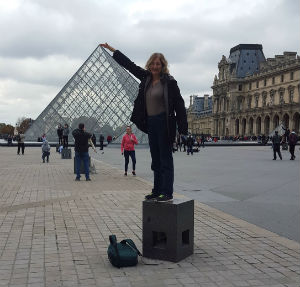[Jill’s Note: If you prefer to listen rather than read, please scroll to the bottom of this post for the audio version.]
Ever notice how the way we feel about pretty much anything depends on what else is going on?

Whether it’s the mood we happen to be in, or the time of day, or whatever might be on our plate at the moment–we react differently to the same exact news.
For instance, take the terrorist attacks in Paris last month. Be it right or wrong, in general I try not to pay much attention to the “bad” things going on in the world. I’m pretty sure the Paris attacks would have normally gotten filed under the “things I have no control over so there’s no sense dwelling on it” category. I probably would have heard about it and thought “That sucks,” and gone on with business as usual. Yet for me, this one stood out because I had just been to Paris. All I could think about was what if it happened while I was there?
And so I reacted differently.
I kept checking social media for updates, looked at maps of exactly where the shootings were, kept tabs on the death toll, and even watched a live Periscope feed of a guy walking around the city explaining what was happening. At some point, I noticed what I was doing and how it was making me feel, and decided to turn it all off. But not without seeing how this particular act of terrorism “felt” different to me. It hit home just like the Boston Marathon bombings (where I’m from) and the Sept. 11 acts of terrorism back in 2001.
But what really changed?
Only my thought about the situation. An act of terrorism is an act of terrorism. There are any number of ways that anyone, including myself, can feel about them. Those feelings can come from only one place–thoughts. And thoughts are relative.
Had I not just been to France, I can guarantee you that my thoughts about the Paris attacks would have been different. Had I not been from Boston, my thoughts on that attack would have also been different. Or what if I was a terrorist myself? Then my thoughts, feelings and reactions on all of the above would have surely been different.
It’s the same with everything.
Here’s another example: For the past few weeks I’ve been helping out a close family member who was suddenly diagnosed with cancer. The original prognosis was bleak. With that as a baseline, when biopsy results came back that it was a more treatable type of cancer, suddenly it was good news despite the fact that it was still cancer. Had I heard the current biopsy results first (without living the past week with the bleak prognosis on my mind) I would not have seen it as good news. My old baseline was any news about cancer was bad, bad and more bad.
While I can’t change the things that are happening around me, seeing more clearly how my thoughts are all relative is a game changer. It clearly illustrates how it’s not the outside situation causing my feelings, but my thoughts about it. If it were the situation, I would feel the same way about the Paris attacks as I feel about an attack somewhere I’ve never been, yet (rightly or wrongly) I don’t. If it were the situation, I would feel the same about any cancer diagnosis, regardless of the prognosis.
Every day I’m discovering more proof of how our thoughts create our reality, and am 100% convinced. How about you? –Jill
Don’t forget to leave your thoughts below!
Prefer listening? Click the green arrow below!

Thank you for this post, Jill. For me, anything related to health and physical safety starts to go into a gray zone, where it’s more difficult for me to see that my experience is still thought created.
That’s totally been me as well, Mary. I have surprised myself quite a bit at how gracefully (mostly) I’ve been handling this. I can say for sure that I couldn’t be more grateful for my understanding of our innate health and wellbeing during this time!
Jill, just thank you. The perspective is important that we create our experience. The caring heart you demonstrate is also really important!
Thank you, Beth!